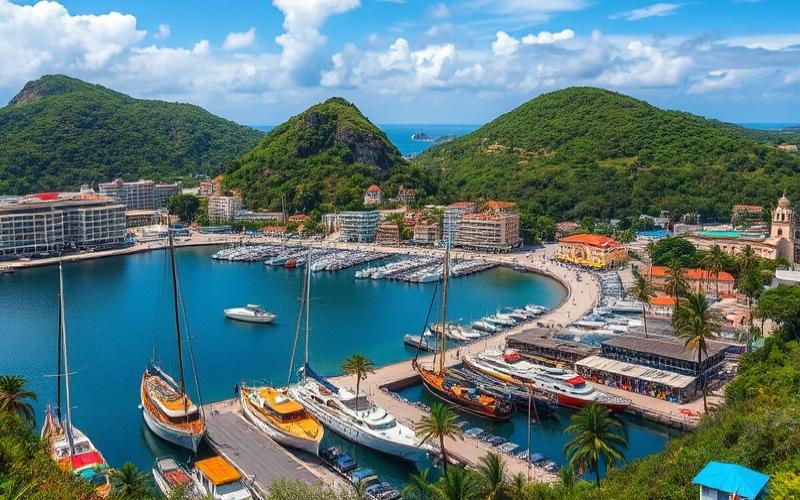
 Published on and written by Cyril Jarnias
Published on and written by Cyril Jarnias
Vanuatu: A Paradise for Digital Nomads
With its enchanting paradisiacal landscapes, Vanuatu is emerging as an attractive refuge for digital nomads seeking professional freedom and quality of life.
Impact on the Local Rental Market
This growing trend of a globalized digital workforce, bringing with it its habits and aspirations, has significant repercussions on the local rental market. Far from being insignificant, this international digital presence is transforming the archipelago’s real estate dynamics.
Good to Know:
Digital nomads often seek medium-term rentals with good internet connections, which drives up prices in certain neighborhoods.
Economic and Social Challenges
This situation generates both economic enthusiasm and social concerns. Between opportunities and challenges, the impact of digital nomads in Vanuatu is becoming a crucial subject of analysis to understand how this global phenomenon is redefining the usual boundaries of work and residence.
The Digital Nomad Phenomenon in Vanuatu
In recent years, Vanuatu has seen a notable evolution in the digital nomad phenomenon, with a gradual increase in the number of remote workers choosing the archipelago as a destination, whether for temporary or extended stays.
Evolution and Key Data
- Internet penetration in Vanuatu reached 45.7% in 2025, representing approximately 151,000 users. This figure increased by 2.3% between January 2024 and January 2025.
- The steady rise in internet adoption rates reflects an increasingly attractive digital environment for digital nomads.
Main Motivations for Digital Nomads Choosing Vanuatu
- Favorable immigration policies: Several visa programs facilitate entry and extended stays for remote workers.
- Quality of life: The preserved natural setting, safety, and local friendliness appeal to those seeking a balance between work life and personal well-being.
- Digital infrastructure: The regular improvement in internet coverage allows mobile professionals to maintain their activities without major interruptions.
Testimonials
“Working facing the lagoon every morning changed my routine. The warm welcome allowed me to quickly build connections with the local community.”
“Even if the connection isn’t always perfect in remote areas, I find everything I need here to work effectively in a unique setting.”
Socio-economic Impact on Local Communities
List of observed effects:
- Significant increase in seasonal or annual rental demand in urban neighborhoods near the coast
- Rapid development of shared spaces (co-working) adapted to the specific needs of international teleworkers
- Economic diversification through the emergence of related activities (international dining, digital services)
Summary Table
| Impact | Concrete Example |
|---|---|
| Real Estate Demand | Temporary rise in urban rents |
| Co-working | Opening of two new dedicated spaces |
| Ancillary Services | New dining/cafe offerings |
Opportunities and Challenges for the Local Real Estate Market
Opportunities:
- Increased valuation of existing real estate portfolio
- Incentive to renovate or develop housing adapted to international needs
- Stimulation of the off-season tourism sector through continuous flow
Challenges:
- Occasional tension in the traditional rental market
- Potential risk of residential exclusion for some local families facing rapidly increasing rents
Perspectives from local stakeholders:
“The growing demand pushes us to rethink our offerings: some owners are converting their secondary residences into furnished long-term rentals specifically designed for these new profiles.”
This phenomenon continues to transform Vanuatu’s social and economic landscape while raising the ongoing need to adjust public policies and sector strategies so that this growth sustainably benefits local communities.
Good to Know:
In recent years, Vanuatu has seen a notable increase in the number of digital nomads thanks to its attractive immigration policies and enviable quality of life, attracting those seeking work-life balance. Drawn by its paradisiacal beaches and robust digital infrastructure, many discover an ideal setting here, as testified by Sarah, a Canadian web developer, who rents a house with an ocean view for a fraction of the cost of city living. Their presence has stimulated the rental market, intensifying demand for furnished and modern housing, with price increases observed mainly on tourist islands. Coworking spaces have emerged to meet this need, creating jobs and fostering knowledge transfer between expatriates and locals. However, the rise of these nomads also poses challenges, particularly for lower-income residents displaced by rising rents, and for property managers who must adapt their offerings to a more dynamic and competitive market.
The Rise of Coliving for Digital Nomads
The rise of coliving in Vanuatu among digital nomads is explained by a combination of structural and cyclical factors, in line with the evolution of remote work modes. Several elements have stimulated this rapid growth:
- Increased search for flexibility in accommodations, allowing digital nomads to avoid long or rigid rental commitments.
- Need for infrastructure adapted to online work (fast internet, integrated coworking spaces).
- Desire to join an international community to break isolation and develop professional networks.
- Budget optimization through cost sharing (rent, services, equipment).
The characteristics of coliving that particularly appeal to these itinerant workers include:
| Asset | Description |
|---|---|
| Flexibility | Short or medium-term rentals without significant deposits or heavy administrative procedures. |
| Community | Regular organization of networking events, workshops, and social activities. |
| Shared Spaces | Equipped offices for coworking; common lounges and kitchens promoting friendliness. |
| Included Services | Regular cleaning, guaranteed high-speed internet access in all common or private areas. |
| Shared Cost | Utilities (water/electricity/internet) included in the monthly package; possibility to distribute certain expenses. |
Infrastructure in Vanuatu is evolving rapidly to attract this mobile clientele:
- Notable improvement in the fiber optic internet network in Port-Vila and some main islands.
- Accelerated development of new adapted housing: modular connected studios, residences integrating multifunctional common spaces.
- Creation of specific “Digital Nomad” visas facilitating temporary residence.
Consequences on the local rental market:
- Gradual price increase in certain urban segments favored by foreign mobile clientele.
- Diversification of the real estate portfolio with emergence of hybrid accommodations: premium shared villas, fully equipped apartments for short professional stays.
Notable examples in Vanuatu:
- Nomad Bay Coliving
- Residence located in Port-Vila offering private rooms with direct access to a 24/7 open coworking space.
- Weekly program of professional meetups and wellness workshops; strong international community.
- Vanuatu Digital Retreats
- Shared villas near northern beaches offering all-inclusive packages (accommodation + private office + discovery outings).
- Emphasis on slow travel & work-life balance.
- EcoCo-Live Efate
- Eco-responsible coliving focused on sustainability: solar panels, collective management of organic garden.
- Modern collaborative spaces dedicated to technological entrepreneurial projects.
These initiatives are meeting with great success thanks to their ability to precisely meet the evolving expectations of digital nomads: administrative simplicity, technical quality of digital infrastructure, and human richness through active community life.
The rapid development of coliving is thus durably transforming the local real estate offering while strengthening Vanuatu’s international appeal to connected nomadic workers.
Good to Know:
The rise of coliving in Vanuatu meets the growing needs of digital nomads seeking flexibility and a vibrant professional network, while sharing living costs. The archipelago’s infrastructure, including high-speed internet and shared workspaces, is adapting to this growing demand, fostering the emergence of coliving places like “Digital Nomad Haven” in Port-Vila, renowned for its modern facilities and collaborative atmosphere. These developments stimulate the rental market, leading to diversification of accommodations and rising real estate prices in some sought-after areas, while attracting international professionals eager to combine work with discovery of a distinct local culture.
Impact of Digital Nomads on the Local Rental Market
The growing arrival of digital nomads in Vanuatu significantly influences the local rental market, particularly in sought-after areas like Port-Vila and Efate Island. This trend leads to increased demand for well-equipped, connected, and ideally located housing adapted to the needs of international teleworkers.
| Aspect | Before Massive Arrival of Digital Nomads | After Massive Arrival of Digital Nomads |
|---|---|---|
| Availability | Wide choice for locals and expatriates | Strong competition in central neighborhoods |
| Short-term Rental Prices | Moderate | Marked increase |
| Long-term Rental Prices | Relatively stable | Continuous upward pressure |
| Housing Supply | Primarily oriented towards families/locals | Growth in furnished/high-end segment |
Neighborhoods popular with digital nomads see their attractiveness reinforcing pressure on rents. In Port-Vila particularly, several property owners report a “strong increase in short-term foreign requests,” with some preferring to convert their properties to seasonal or high-end rentals to optimize profitability.
“We receive more offers each month to rent by the week or month to foreigners than for a year to a local family. Yields are better with digital nomads,” explains a local property owner.
Many residents emphasize that this evolution reduces the available stock for long-term rentals intended for permanent inhabitants, which indirectly contributes to driving up prices even outside the city center.
Potential Long-term Consequences
- Progressive gentrification of certain urban neighborhoods
- Forced geographical displacement of local residents to the periphery
- Transformation of the real estate portfolio with multiplication of properties dedicated to short-term or high-end use
- Possible increase in overall housing costs for the entire local population
Some experts indicate that if this dynamic continues without specific regulation, it could worsen inequalities in housing access between the local population and new international arrivals.
Regarding local policies, there is currently (in 2025) no strict regulation specifically governing the presence or real estate activity related to digital nomads. However, the government encourages this type of reception deemed economically beneficial through the self-funded visa and various incentive measures; no concrete measures have yet been adopted to explicitly protect the rental supply intended for permanent residents.
Good to Know:
In Vanuatu, the growing influx of digital nomads has significantly influenced the rental market, notably causing a marked price increase in sought-after neighborhoods such as Port-Vila and Luganville. According to recent statistics, rents have increased by 15% over the past two years, particularly impacting short-term housing favored by these nomadic workers. Many owners, attracted by higher yields, prefer renting to these nomads, thereby constraining locals to find alternative solutions. Testimonies from residents indicate a risk of gentrification, with traditional housing transforming into modern spaces adapted to the expectations of new arrivals. Local authorities are beginning to consider regulations to balance this phenomenon, but initiatives remain embryonic. Local owners, like Jean, note that this trend is modifying the supply with a proliferation of cohabitations and renovated apartments, posing challenges for long-term residents seeking affordable rentals.
Key Takeaway:
The rise of digital nomads certainly stimulates certain economic segments but also accentuates tensions on affordable housing—an issue that may soon require regulatory adjustment.
Short-term Rental Contracts: A Rising Trend
The rise of digital nomads in Vanuatu has transformed the rental market, notably through a marked increase in demand for short-term rental contracts. This trend is explained by several factors:
- Digital nomads prioritize temporary and flexible housing that adapts to their frequent mobility.
- Furnished rentals, with high-speed internet and spaces dedicated to telework, are particularly sought after.
- The possibility of booking online via international platforms facilitates quick access to these accommodations.
Why Are Short Contracts Favored?
- Contract flexibility: no long-term commitment, easy renewal or early departure without major penalties.
- Adaptation to specific needs: equipped housing (furniture, internet), all-inclusive billing (water, electricity) and additional services (cleaning).
- International mobility: ease of transition between countries or regions without heavy administrative constraints.
Implications on the Local Market
| Effect | Explanation |
|---|---|
| Rent Increases | Increased demand drives prices up in attractive neighborhoods |
| Decrease in Residential Supply | Fewer properties available for the permanent local population |
| Specialization of the Portfolio | Increase in the number of furnished apartments reserved for short stays |
Studies conducted in similar markets show that the massive arrival of digital nomads sometimes contributes to a surge in rents (+20% in a few years in some tourist urban centers). In Vanuatu, even if few precise figures currently exist, a gradual shift of the traditional rental portfolio towards seasonal or flexible rentals is already observed.
Observed Responses from Property Owners
- Growing preference for short-term rentals managed via platforms like Airbnb or Booking.com
- Investments in “work-friendly” amenities to capture this international clientele
- Potential increase in rental yield but also greater volatility depending on seasonality
Emerging Government Regulations
Some jurisdictions are considering—or have already implemented—measures such as:
- Annual quotas on the maximum number of days rentable for short terms
- Mandatory declarations to local tax authorities
- Negative tax incentives aimed at limiting residential displacement
To date in Vanuatu, there is not yet a very structured specific regulation governing this phenomenon. However, faced with emerging tensions on the availability and accessibility of permanent housing for local residents—particularly young workers and families—a public debate has begun around possible stricter regulation.
In summary, while the growing arrival of digital nomads undoubtedly boosts real estate profitability through flexible short-term rentals adapted to the international mobile lifestyle, it also raises important social challenges regarding maintaining affordable supply for permanent residents.
Good to Know:
The arrival of digital nomads in Vanuatu has strongly increased demand for short-term rentals, valued for their flexibility and suitability for the frequent mobility of remote workers. These rentals, favoring leases from a few weeks to several months, have seen their rates climb, sometimes by 20% according to some local studies, while making supply scarcer for permanent residents, who now struggle to find affordable housing. Owners, attracted by higher yields, are adapting by adjusting their offerings to attract this dynamic clientele. However, faced with this evolution, the Vanuatu government is considering regulating the rental market to protect locals’ access to housing. Examples in Port-Vila illustrate this trend, where short-term rentals now represent about 30% of available housing.
Disclaimer: The information provided on this website is for informational purposes only and does not constitute financial, legal, or professional advice. We encourage you to consult qualified experts before making any investment, real estate, or expatriation decisions. Although we strive to maintain up-to-date and accurate information, we do not guarantee the completeness, accuracy, or timeliness of the proposed content. As investment and expatriation involve risks, we disclaim any liability for potential losses or damages arising from the use of this site. Your use of this site confirms your acceptance of these terms and your understanding of the associated risks.
















































